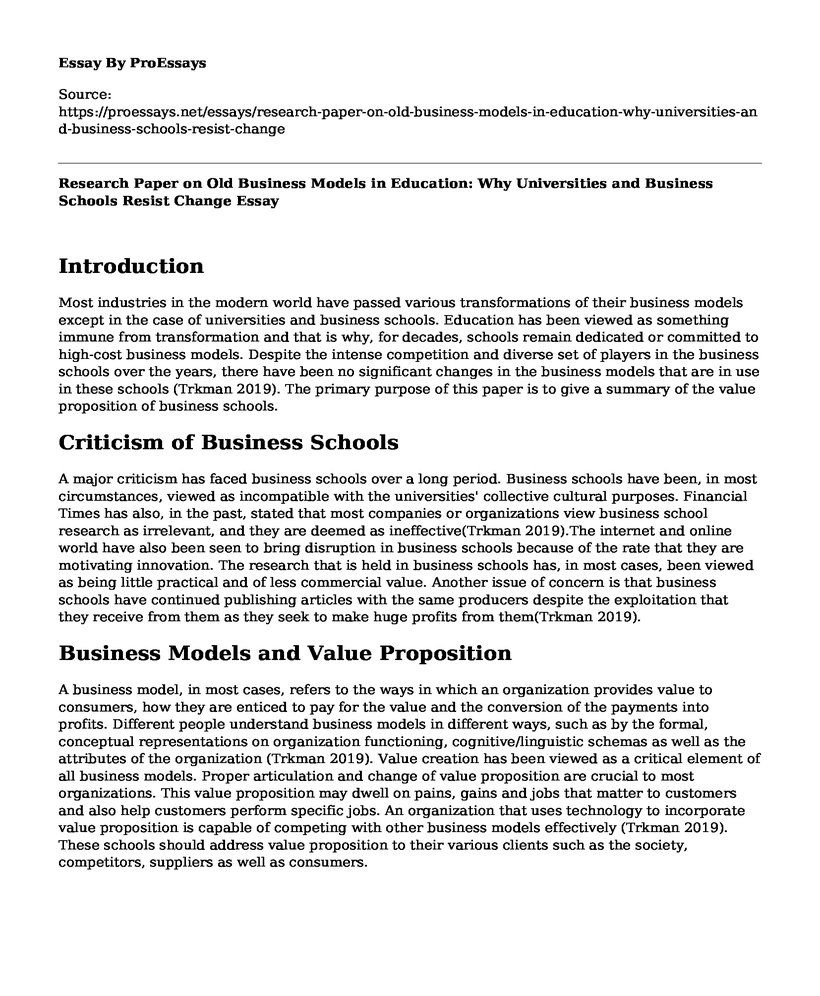Introduction
Most industries in the modern world have passed various transformations of their business models except in the case of universities and business schools. Education has been viewed as something immune from transformation and that is why, for decades, schools remain dedicated or committed to high-cost business models. Despite the intense competition and diverse set of players in the business schools over the years, there have been no significant changes in the business models that are in use in these schools (Trkman 2019). The primary purpose of this paper is to give a summary of the value proposition of business schools.
Criticism of Business Schools
A major criticism has faced business schools over a long period. Business schools have been, in most circumstances, viewed as incompatible with the universities' collective cultural purposes. Financial Times has also, in the past, stated that most companies or organizations view business school research as irrelevant, and they are deemed as ineffective(Trkman 2019).The internet and online world have also been seen to bring disruption in business schools because of the rate that they are motivating innovation. The research that is held in business schools has, in most cases, been viewed as being little practical and of less commercial value. Another issue of concern is that business schools have continued publishing articles with the same producers despite the exploitation that they receive from them as they seek to make huge profits from them(Trkman 2019).
Business Models and Value Proposition
A business model, in most cases, refers to the ways in which an organization provides value to consumers, how they are enticed to pay for the value and the conversion of the payments into profits. Different people understand business models in different ways, such as by the formal, conceptual representations on organization functioning, cognitive/linguistic schemas as well as the attributes of the organization (Trkman 2019). Value creation has been viewed as a critical element of all business models. Proper articulation and change of value proposition are crucial to most organizations. This value proposition may dwell on pains, gains and jobs that matter to customers and also help customers perform specific jobs. An organization that uses technology to incorporate value proposition is capable of competing with other business models effectively (Trkman 2019). These schools should address value proposition to their various clients such as the society, competitors, suppliers as well as consumers.
Declarative Value Proposition of Business Schools
Business graduates have various knowledge areas, subject-specific skills and competencies (Trkman 2019). In addition to these, soft skills, which include both interpersonal and intrapersonal skills, have been emphasized in terms of their importance. Traditional business school models are seen as likely to succeed and survive if both soft and hard skills are developed and scaled up successfully. The schools value should not be judged solely on the soft and hard skills as it is ill-judged but rather emphasize on the public and social value of the graduates in the society (Trkman 2019). Human abilities such as wisdom and morality should also be stressed so that they can make ethical decisions and focus on social responsibility.
Additional Value Proposition of Teaching
Studying at business schools has extra value, and this may include keeping students busy and happy as well as intellectually stimulated. They also make sure that they change the mind-sets of people to think and act like businesspersons (Trkman 2019). Various value propositions have been discussed. The first includes rankings where business schools use this to ensure that those who go to school together are excellent. Secondly, the peacock's tail effect, which helps in providing that it shows that the owner is well prepared. Lastly, commitment and a sense of purpose have been confirmed as an additional value proposition to teaching.
Conclusion
Business schools have been seen as places that have not transformed their business models like other organizations. This paper has discussed the criticism that the business schools receive as well as the relationship between business models and value proposition. Finally, the declarative and additional value have also been discussed vividly, and the business school setting will likely change dramatically in the coming years.
References
Trkman, P., 2019. Value proposition of business schools: More than meets the eye. The International Journal of Management Education, 17(3), p.100310.
Cite this page
Research Paper on Old Business Models in Education: Why Universities and Business Schools Resist Change. (2023, Mar 04). Retrieved from https://proessays.net/essays/research-paper-on-old-business-models-in-education-why-universities-and-business-schools-resist-change
If you are the original author of this essay and no longer wish to have it published on the ProEssays website, please click below to request its removal:
- Designing a Training Program Paper Example
- Product Value Proposition of the Coffee House Paper Example
- The Impact of Domestic Violence on Children Annotated Bibliography
- Elon Musk: A 21st Century Billionaire Entrepreneur - Research Paper
- My Goal is to Become a Biochemist - Free Paper Example
- Addressing Substance Abuse in Schools: Challenges, Interventions, and Comprehensive Policies - Free Report
- My Personal Nursing Philosophy - Free Essay Example







